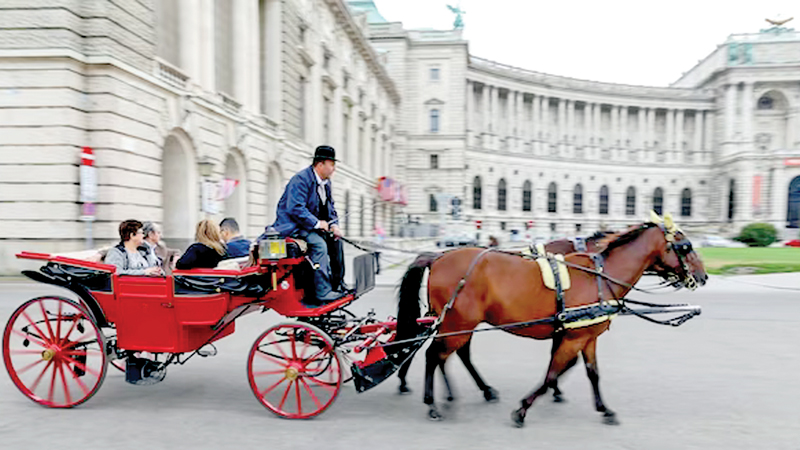 You will be surprised to learn that words travel tirelessly as people. They travel in the knapsacks of armies, in the manuals of salesmen, with missionaries, refugees and filmmakers. They cross mighty rivers, oceans, jump ship and settle in foreign lands.
You will be surprised to learn that words travel tirelessly as people. They travel in the knapsacks of armies, in the manuals of salesmen, with missionaries, refugees and filmmakers. They cross mighty rivers, oceans, jump ship and settle in foreign lands.
Sometimes, like humans, they go back to their own countries and they are not easily recognised by their natives. Such a word is ‘pedigree’ which travelled to France where it was pronounced as ‘peh-dee-gray.’ However, the French people never considered it as an alien word.
Largely for reasons of national pride, the French often try to deport foreign words. If they fail in their attempt, they try native replacements. The French Academy holds itself responsible for maintaining the chastity of the national tongue. As far as possible, they try not to borrow words from foreign languages. When the English word ‘weekend’ travelled to France, they coined ‘fin de semaine’ (end of week) which seems to be an unhappy coinage.
The French had to deal with an uphill task when new words came from space, computers and other areas of advanced technology dominated by English, Russian and Japanese. Sometimes, the French succeeded in coining new words. During de Gaulle’s heady nationalistic rule, it was unthinkable for French commentators reporting on the Pacific Ocean return of American space vehicle to refer to it as ‘lesplashdown’. They used the French term ‘atterrisage’ meaning a dry-land plane’s touchdown and later changed it to ‘amerrissage.’
French Academy
Efforts to repel foreign words sometimes do not work. The French borrowed the English word ‘know-how’ and used it as ‘le know-how technologique’. When the English word ‘brinkmanship’ travelled to France, the French Academy threw up its hands and came up with a highly indigestible term: ‘la politique du bordgouffre’ (the politics of the border of the gulf).
When the English word ‘Shakespearean’ travelled to Italy, it was thought to be a hideously barbaric term. The Italians removed the hideous ‘k’ to the trashcan and came up with an Italian word for ‘Shakespearean’ as ‘Scespirian.’ It looks like that the foreign invader succumbed to Italy’s civilising charm. ‘Gusto’ was originally an Italian word meaning taste or pleasure. When it travelled to the United States, it took on its present hearty, lip-smacking, beer-drinking personality.
The German word ‘knecht’ meaning ‘man-at-arms’ trailed a humble spearbehind the blueblood, the mounted ‘Ritter’ or rider. When the word ‘knecht’ travelled to England, it muscled its way to a new social status. This shows that unlike French, English is quite capable of assimilating foreign words because of its loose half-breed structure. English was enriched by one of its parents Germanic (via Old English) and the other Latin (via the Church and Norman French).
Whoever thought that the ancestors of the English word ‘admiral’ were Old French and the Arabic word ‘Amir’ meaning ‘Commander’. Sometimes, English has borrowed words from Russian. The word ‘politburo’ was derived from the Russian word ‘polibyuro’ meaning ‘the executive committee of the Communist Party’ by extension any group in control of an organisation or state. Only a few Russian words have travelled to England. ‘One such word is ‘Cosmonaut’ for ‘astronaut’. The Soviet Space Program once announced “Three Cosmonauts were killed in the explosion.”
A large number of French words and expressions have travelled to England and are staying there permanently. One such word is ‘abattoir’(slaughter house for the killing and preparation of fresh meat). In Midsummer Night’s Dream, William Shakespeare wrote: “And, farewell, the Thisbe ends. Adieu, adieu friends.” ‘Adieu’ means ‘goodbye.’
The French term ‘a la carte’ (from a menu on which each item is separately priced) has come to stay in England. Its abbreviated from is ‘a.l.c.’ Even the word ‘amateur’ (a person who pursues a particular interest, line of studies, sport or other activity on an unpaid, non-professional basis, usually out of enthusiasm for it) has been absorbed into English.
Oscar Wilde wrote: “Oh no, Lady Caroline. I have only had one husband as yet. I suppose you look upon me as quite an amateur.”
Apart from French, many German words have travelled to England over the years. One such word is ‘angst’(a feeling of apprehension, anxiety, or insecurity.)
I worked with a certain editor (no longer living) who was so fond of the word that he used it in all his editorials. He was also a great fan of Karl Marx. Charles Dickens in ‘Bleak house’ wrote: “He gave me his arm and the two officers courteously bowed me out, and we found at the door phaeton or barouche with a postilian and post horses.” Here the word ‘barouche’ is a German word meaning a four-wheeled horse-drawn carriage.
Basmati
To a lesser extent, many Hindi words have travelled to England. One such word is ‘basmati’ a variety of aromatic, long-grain rice.
Rudyard Kipling in “Her chance in life” wrote: “He had the noise of the Bay of Bengal and a Bengal Babu for company.” ‘Babu’ means a gentleman. The word ‘bungalow’ is borrowed from Hindi ‘bangla’ (a single-story house). You can see many bungalows in tea estates.
Harriet Beecher Stowe in her popular work ‘Uncle Tom’s Cabin’ refers to a woman wearing a new calico dress. ‘Calico’ in Hindi means ‘a white cotton cloth.’
Many Italian words have travelled to England to enrich English. In the sentence, ‘The group was obliged to sing a cappella after the accompanist failed to turn up’ ‘a cappella’ means ‘unaccompanied or without instrumental backing.’ The term is often used in music.
‘Alfresco’ (open air or outdoor) is another Italian word which is very much popular in English. If the weather is fine, you can enjoy an alfresco meal. When we refer to the Maldives, the Italian word ‘archipelago’ comes to mind. It means ‘a large body of water containing numerous islands.’ ‘Arsenal’ is another Italian word used in English. It means ‘a store of weapons and munitions or more generally any store of reserve.’
Many Spanish words have travelled to England. Some of them are ‘bonanza’ (lucky success or fount of great prosperity), ‘bravado’ (a pretence of bravery), ‘cabana’ (a simple beach house often with an open side facing the seashore or a swimming pool), ‘cafeteria’ (coffee house) and ‘chilli’(hot pepper made from the pod of the pepper).
A few Sinhala, Urdu, Tamil and Yiddish words too have travelled to England. English speakers now use the Sinhala word ‘beriberi’(a tropical disease caused by a deficiency of thiamine resulting in inflammation of the nerves, paralysis, edema of the extremities and heart failure) and ‘biriyani’ an Urdu word meaning ‘a dish of spiced meat or vegetables, served with rice.’
The Tamil word ‘catamaran’ (a boat with twin hulls) is now used in English. To refer to a supernatural being, we use the Hebrew word ‘cherub.’ Modern writers are very fond of the Yiddish word ‘chutzpah’ which simply means ‘self-confidence, audacity, and effrontery.’ In times to come, many more foreign words will take wing to settle down in England.




